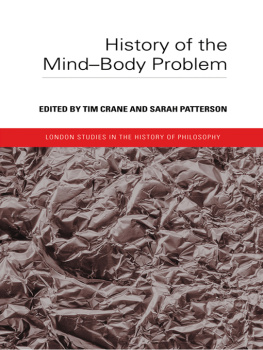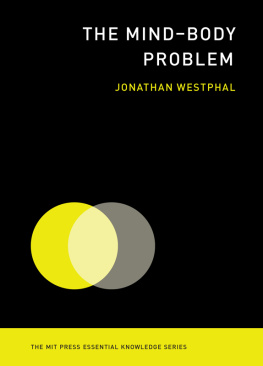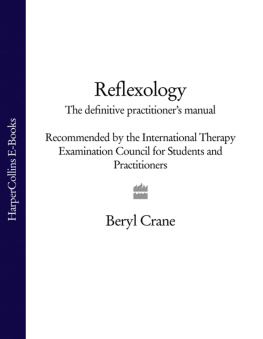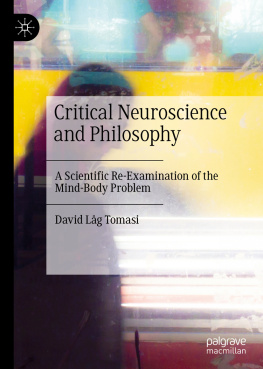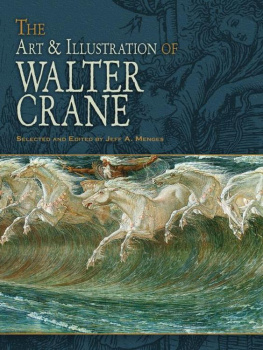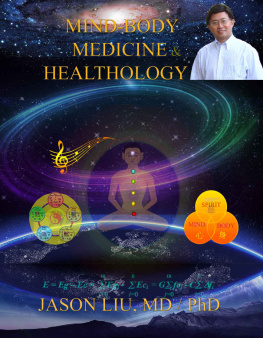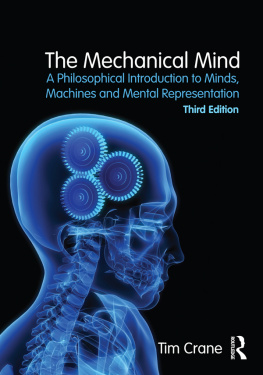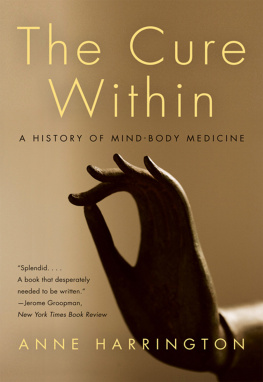Crane Tim - History of the Mind-Body Problem
Here you can read online Crane Tim - History of the Mind-Body Problem full text of the book (entire story) in english for free. Download pdf and epub, get meaning, cover and reviews about this ebook. City: London, year: 2002;2000, publisher: Taylor and Francis;Routledge, genre: Religion. Description of the work, (preface) as well as reviews are available. Best literature library LitArk.com created for fans of good reading and offers a wide selection of genres:
Romance novel
Science fiction
Adventure
Detective
Science
History
Home and family
Prose
Art
Politics
Computer
Non-fiction
Religion
Business
Children
Humor
Choose a favorite category and find really read worthwhile books. Enjoy immersion in the world of imagination, feel the emotions of the characters or learn something new for yourself, make an fascinating discovery.
- Book:History of the Mind-Body Problem
- Author:
- Publisher:Taylor and Francis;Routledge
- Genre:
- Year:2002;2000
- City:London
- Rating:4 / 5
- Favourites:Add to favourites
- Your mark:
- 80
- 1
- 2
- 3
- 4
- 5
History of the Mind-Body Problem: summary, description and annotation
We offer to read an annotation, description, summary or preface (depends on what the author of the book "History of the Mind-Body Problem" wrote himself). If you haven't found the necessary information about the book — write in the comments, we will try to find it.
History of the Mind-Body Problem — read online for free the complete book (whole text) full work
Below is the text of the book, divided by pages. System saving the place of the last page read, allows you to conveniently read the book "History of the Mind-Body Problem" online for free, without having to search again every time where you left off. Put a bookmark, and you can go to the page where you finished reading at any time.
Font size:
Interval:
Bookmark:

John Cottingham , Professor of Philosophy at the University of Reading, is one of the worlds leading Descartes scholars, and one of the translators of the Cambridge edition of Descartes writings. He is the author of many books on Descartes, as well as a work of moral philosophy, Philosophy and the Good Life (Cambridge 1998).
Tim Crane is Reader in Philosophy at University College London, and the author of The Mechanical Mind (Penguin 1995). He has also published a number of articles on the philosophy of mind, and edited The Contents of Experience (Cambridge 1992) and Dispositions: a Debate (Routledge 1996). He is one of the editors of London Studies in the History of Philosophy , of the Routledge International Library of Philosophy , and the Routledge Philosophical Guidebooks .
Susan James is Reader in Philosophy at Birkbeck College London. She is the author of The Content of Social Explanation (Cambridge 1984) and Passion and Action (Oxford 1997). She was previously a lecturer at the University of Cambridge.
Rae Langton is Professor of Philosophy at the University of Edinburgh. She is the author of Kantian Humility (Oxford 1999) and a number of papers on moral philosophy, metaphysics and the history of philosophy.
Neil Campbell Manson is a Research Fellow at Kings College Cambridge, and presently working on the philosophy of consciousness.
M.G. F. Martin is Lecturer in Philosophy at University College London and the editor of Mind . He has published many articles on the philosophy of mind (especially the philosophy of perception) and he is presently completing a book on perception.
Sarah Patterson is Lecturer in Philosophy at Birkbeck College London. She was previously assistant professor of philosophy at Tufts University, Harvard University and the University of Michigan, and she has published papers in contemporary philosophy of psychology.
M.W. F. Stone is Lecturer in the Philosophy of Religion at Kings College London. He is the author of a forthcoming book on the history of the concept of casuistry, and a number of articles on medieval philosophy. He is one of the series editors of London Studies in the History of Philosophy .
Tim Crane and Sarah Patterson
Herbert Feigl once described the mindbody problem as a cluster of intricate puzzles some scientific, some epistemological some semantical and some pragmatic.
These different conceptions of the problem tend to be accompanied by different conceptions of the cause of the problem: for some, the problem arises because of the assumption that mind and body are distinct (essentially, dualism). This assumption then demands that we explain how mental causation is possible, if mind and body are distinct things. But on other views, the problem arises from fundamentally physicalist assumptions. It is because we think that the world is completely physical in nature, that we find it hard to understand how mental phenomena (specifically subjectivity and consciousness) fit into the world so conceived. Here physicalism, the view that the world is fundamentally physical, is not the solution to the mindbody problem, but part of what poses the problem.
Further disagreement emerges about the extent of our present understanding of the problem, and the extent to which any progress has been made. Thomas Nagel is well-known for his pessimism on this score, and has said that a solution to the mindbody problem will alter our conception of the universe as radically as anything has to date.
What we have, then, in the contemporary debate, are different views of how the problem should be stated, different views of its source, and different views of its present condition and importance. It is clear, then, that the question what is the relation between the mind and the body? and the question what is the place of the mind in the physical world? do not raise just one or two philosophical problems. Rather, they are ways of expressing many very different kinds of concern and preoccupation. The essays in this book are attempts to understand some of these various preoccupations from a broadly historical perspective.
Looking at the history of the mindbody problem in western philosophy at some distance, we can detect three very general trends of thought, or paradigms, which have dominated much discussion: the Aristotelian paradigm, the Cartesian paradigm, and the scientific materialist (or physicalist) paradigm. Each of these paradigms is touched on in this collection. Rae Langtons essay discusses the currently live debate about the extent to which it makes sense to classify Aristotle as a functionalist. M.W.F. Stone explores one of the issues the question of monopsychism raised by the absorption of Aristotles De Anima into the philosophy of the Middle Ages. The essays by Susan James, John Cottingham and Sarah Patterson are concerned with various aspects of Descartes conception of mind, including the way his account of mind has been interpreted, misinterpreted and elaborated by twentieth-century thinkers. The main issue for materialist or physicalist theories of mind has been consciousness, and the last three essays in the book deal with the various issues surrounding the notion of consciousness. Neil Campbell Manson examines the nineteenth-century sources of the conscious/non-conscious contrast, Tim Crane relates the contemporary debate about the qualitative features of experience (or qualia) to the original use of the concept of qualia in early twentieth-century thought, and M.G.F. Martin gives an account of the nature of the problem of perception in the twentieth century. The essays therefore cover a wide range of themes, writers and philosophies; that all these can be brought under the heading of the mindbody problem is more evidence for Feigls claim about the problem.
Aristotles view, called hylomorphism, is that the soul is the form of the bodys matter. The body is ensouled matter, the soul imposes a form on the matter of the body. Should this view be thought of as a materialist view or a dualist view, or neither? Or is it even possible to impose our contemporary classifications upon the theories of antiquity with any precision? Aristotles view certainly has affinities with materialism, since the whole person is in a sense nothing over and above its matter organised in a certain way. But the view also seems to have a dualist element, since the matter needs the soul in order to be the thing it is: it would clearly be wrong to think of Aristotle as some kind of reductionist. So neither classification seems appropriate. Of course, in one sense this is hardly surprising, since it is arguable that the kinds of views which we now think of as materialist and dualist have their origins in a metaphysical climate (the scientific revolution of the early modern period) which was explicitly hostile to Aristotles way of thinking about substances.
Some years ago, Hilary Putnam and Martha Nussbaum proposed an alternative: Aristotles conception of mind should be thought of as a prototype of the functionalist conception of mind pioneered (and later rejected) by Putnam in the 1960s and 1970s. According to functionalism, mental states should be thought of in terms of their characteristic causal roles: it is not essential to a mental state that it has a certain physical nature, what is essential is rather the causal role it plays in the mental life of the creature.
In a much discussed paper, Myles Burnyeat rejected the Putnam/Nussbaum interpretation.it impossible to read our contemporary ideas about matter and function back into Aristotles conception of the soul as the form of the body.
Langton distinguishes various strands in the functionalist programme, and points out that Burnyeats argument, if successful, applies only to a functionalism committed to physical realisation; but the bare idea of a functionalist account of mental states (basic functionalism) need not be so committed. Langton argues that ultimately it is function, rather than matter, which presents an obstacle to viewing Aristotle as a functionalist: the abstract, quasi-mathematical character of functional definition poses a more serious difficulty for the interpretation than does Aristotles magical matter.
Font size:
Interval:
Bookmark:
Similar books «History of the Mind-Body Problem»
Look at similar books to History of the Mind-Body Problem. We have selected literature similar in name and meaning in the hope of providing readers with more options to find new, interesting, not yet read works.
Discussion, reviews of the book History of the Mind-Body Problem and just readers' own opinions. Leave your comments, write what you think about the work, its meaning or the main characters. Specify what exactly you liked and what you didn't like, and why you think so.

